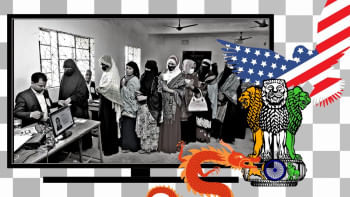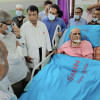Trouble brewing in AL’s backyard

Elections are festive times providing an opportunity for the candidates to connect with their voters, and for the voters to have the ear of their candidates. It is a rule of thumb that the ruling party candidates pledge to continue with the government's initiatives, while the opposition candidates slam the government for failing to ensure the people's welfare and pledging that they would do a better job if elected to office. This electoral sparring between the government and the opposition is a common phenomenon in the election campaign culture.
But the statements and declarations from the mayoral aspirants in the upcoming five city corporation elections, following the announcement of nominations by the ruling Awami League, seemed to flip that script.
Let's begin with Barishal, where Abul Khair Abdullah got the party ticket to run for mayor – the position currently held by his nephew Serniabat Sadiq Abdullah. Abul Khair's first announcement after getting the party nomination was to say, "My only goal is to turn Barishal city, which lacked development activities over the last five years, into a tilottoma (modern) city, to restore the dignity of the citizens of all classes and occupations in this city."
On April 29, Zaheed Farooque, local lawmaker and the state minister for water resources, said at a programme that the prime minister had nominated Abul Khair Abdullah to stop the injustice, exploitation, and criminal activities happening in Barishal. "The people of Braishal can breathe today," he pronounced. He also said that people even teased them as they talked about turning Barishal into a city like Singapore. Seeing the dilapidated roads, even rickshaw pullers scoffed at these promises, the state minister added. His comments were quite in line with those of the mayoral candidate.
All this rhetoric is presumably directed at the incumbent mayor. Both the challenger and the incumbent are from the ruling party and belong to the Serniabat family, akin to royalty within the Awami League, ranked after the Sheikh family. However, such disparaging remarks about a ruling party mayor and slamming of the state of law and order essentially point the finger at the ruling party itself, accusing it of having failed the citizens of Barishal.
Whether this is a reflection of internal party feud or not, the question that begs to be asked is why Barishal citizens should vote for the same party (as the mayoral election is partisan) a second time despite its abject failure, and that, too, when the admission of failure is implicit in discarding the incumbent and nominating another candidate.
Turning to Gazipur, we see that a former mayor, failing to secure the party's nomination, decided to submit his nomination as an independent candidate, only to be rejected later. However, after submitting the nomination paper, he said he was running against a person who had destroyed Gazipur. Although he did not mention the name, it was evident that he was hinting at the ruling party's mayoral candidate Azmat Ullah Khan, who contested the city polls in 2013 too, when Gazipur had just been declared a city corporation and had its first elections.
Zahangir Alam, too, had filed his nomination for Gazipur mayor in the 2013 elections, going against the party wishes to support Azmat. He allegedly went missing as he refused to step aside at the time. He reappeared just before the polls and announced his support for Azmat, visibly weeping while addressing a press conference.
This time, after tendering his nomination, he alleged, "I may be arrested or disappeared after tomorrow."
Then, when the election officials rejected his nomination, Zahangir said, "The Election Commission has deviated from the neutral position it had. I don't know under whose pressure they buckled. But I want justice."
Zahangir's allegations not only strengthen the opposition camp's claims, but also indicate a complete lack of governance. A former mayor is saying that the ruling party nominee has destroyed the city, that he could very well be disappeared for running as an independent candidate, and that the election office is not neutral. Zahangir has stopped short of directly accusing the Awami League for having the election office disqualify his candidacy.
It appears, then, that the Awami League's bold rhetoric of development and prosperity, transparency and good governance, and fostering democracy is rendered hollow by its own partymen – unwittingly or not.
With the ruling party's own men making such allegations, it appears to have taken the words out of the opposition camps' mouth, because this is essentially what the party has been trying to say all long. When the ruling party's own leaders are disgruntled and disillusioned so as to articulate the opposition's argument better than the opposition itself, it does not bode well for either the ruling party or the government.
For now, the BNP can simply watch from the sidelines as the Awami League men slam their own party.
Mohammad Al-Masum Molla is chief reporter at The Daily Star.


 For all latest news, follow The Daily Star's Google News channel.
For all latest news, follow The Daily Star's Google News channel. 











Comments